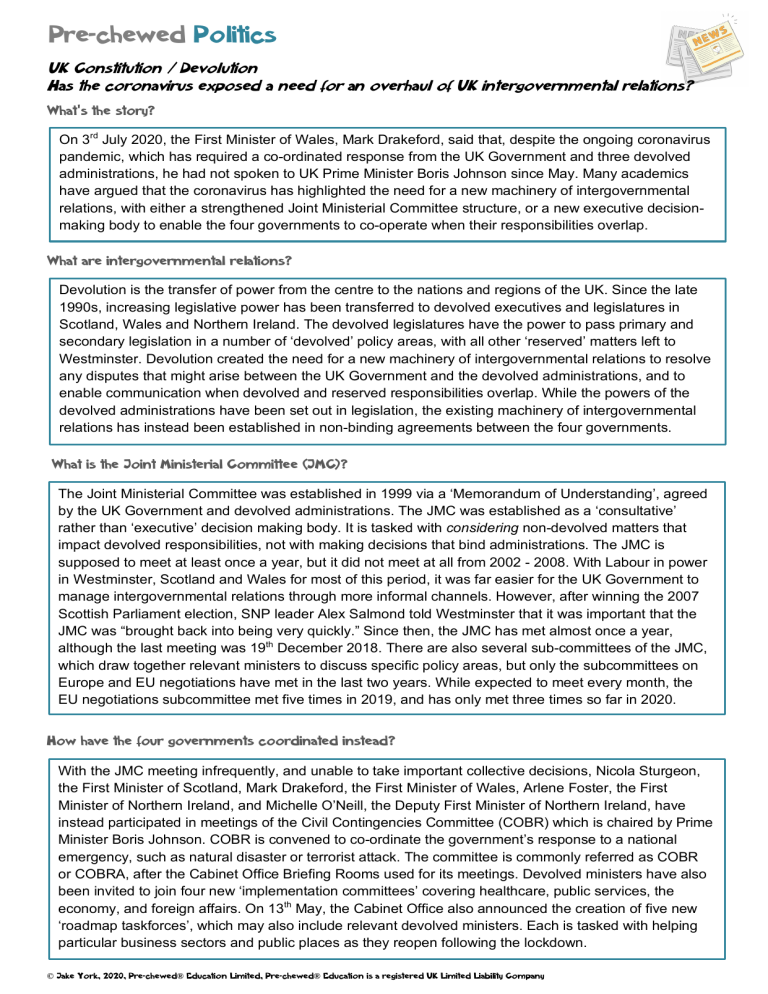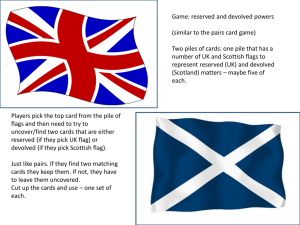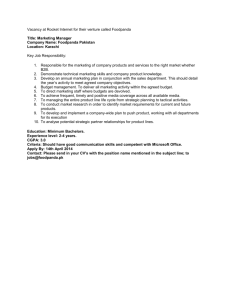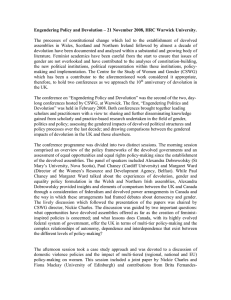
Pre-chewed Politics UK Constitution / Devolution Has the coronavirus exposed a need for an overhaul of UK intergovernmental relations? What’s the story? On 3rd July 2020, the First Minister of Wales, Mark Drakeford, said that, despite the ongoing coronavirus pandemic, which has required a co-ordinated response from the UK Government and three devolved administrations, he had not spoken to UK Prime Minister Boris Johnson since May. Many academics have argued that the coronavirus has highlighted the need for a new machinery of intergovernmental relations, with either a strengthened Joint Ministerial Committee structure, or a new executive decisionmaking body to enable the four governments to co-operate when their responsibilities overlap. What are intergovernmental relations? Devolution is the transfer of power from the centre to the nations and regions of the UK. Since the late 1990s, increasing legislative power has been transferred to devolved executives and legislatures in Scotland, Wales and Northern Ireland. The devolved legislatures have the power to pass primary and secondary legislation in a number of ‘devolved’ policy areas, with all other ‘reserved’ matters left to Westminster. Devolution created the need for a new machinery of intergovernmental relations to resolve any disputes that might arise between the UK Government and the devolved administrations, and to enable communication when devolved and reserved responsibilities overlap. While the powers of the devolved administrations have been set out in legislation, the existing machinery of intergovernmental relations has instead been established in non-binding agreements between the four governments. What is the Joint Ministerial Committee (JMC)? The Joint Ministerial Committee was established in 1999 via a ‘Memorandum of Understanding’, agreed by the UK Government and devolved administrations. The JMC was established as a ‘consultative’ rather than ‘executive’ decision making body. It is tasked with considering non-devolved matters that impact devolved responsibilities, not with making decisions that bind administrations. The JMC is supposed to meet at least once a year, but it did not meet at all from 2002 - 2008. With Labour in power in Westminster, Scotland and Wales for most of this period, it was far easier for the UK Government to manage intergovernmental relations through more informal channels. However, after winning the 2007 Scottish Parliament election, SNP leader Alex Salmond told Westminster that it was important that the JMC was “brought back into being very quickly.” Since then, the JMC has met almost once a year, although the last meeting was 19th December 2018. There are also several sub-committees of the JMC, which draw together relevant ministers to discuss specific policy areas, but only the subcommittees on Europe and EU negotiations have met in the last two years. While expected to meet every month, the EU negotiations subcommittee met five times in 2019, and has only met three times so far in 2020. How have the four governments coordinated instead? With the JMC meeting infrequently, and unable to take important collective decisions, Nicola Sturgeon, the First Minister of Scotland, Mark Drakeford, the First Minister of Wales, Arlene Foster, the First Minister of Northern Ireland, and Michelle O’Neill, the Deputy First Minister of Northern Ireland, have instead participated in meetings of the Civil Contingencies Committee (COBR) which is chaired by Prime Minister Boris Johnson. COBR is convened to co-ordinate the government’s response to a national emergency, such as natural disaster or terrorist attack. The committee is commonly referred as COBR or COBRA, after the Cabinet Office Briefing Rooms used for its meetings. Devolved ministers have also been invited to join four new ‘implementation committees’ covering healthcare, public services, the economy, and foreign affairs. On 13th May, the Cabinet Office also announced the creation of five new ‘roadmap taskforces’, which may also include relevant devolved ministers. Each is tasked with helping particular business sectors and public places as they reopen following the lockdown. © Jake York, 2020, Pre-chewed® Education Limited, Pre-chewed® Education is a registered UK Limited Liability Company Pre-chewed Politics Why was the lockdown described by some as a ‘four nations’ approach? Responding to a global pandemic involves a number of devolved policy areas and public services, from healthcare and education, to policing and the justice system. With many key responsibilities devolved, there was no guarantee that the UK’s response would be uniform across the four nations. However, on 3rd March, one day after political leaders from Scotland, Wales and Northern Ireland participated in a COBR meeting chaired by the Prime Minister, a coronavirus action plan was published by Whitehall that had the backing of all four governments. The plan outlined the steps that might be taken across the UK as the virus spread. With all four administrations’ logos on the cover, it was an extremely unusual policy paper. Boris Johnson’s March 23rd announcement of a lockdown in England was immediately followed by similar statements from the first ministers of Scotland, Wales and Northern Ireland. Under the Sewel Convention, the UK Parliament does not pass legislation on devolved matters until the devolved legislatures have passed a legislative consent motion to signal their approval. Recently, this convention has been strained by Brexit. The EU (Withdrawal Agreement) Act 2018 passed without the Scottish Parliament’s consent, and the EU (Withdrawal Agreement) Act 2020 passed even though all three devolved legislatures had withheld consent. However, the three first ministers quickly signalled their support for the Coronavirus Bill, which was drafted following close consultation between the four governments. The three devolved legislatures then gave their consent just five days after the Bill’s 1st reading in the Commons. Devolved ministers used the powers granted under the Coronavirus Act and existing public health legislation to impose very similar restrictions to those introduced in England by the UK Government - from limits on movement to requirements for a wide range of businesses and public spaces to close. Politicians began to claim that the UK was following a coordinated ‘four nations’ approach to the coronavirus, guided by advice from the Scientific Advisory Group for Emergencies (SAGE), which includes scientific advisors from across the UK and appointees from each government. Has the ‘four nations’ approach come to an end? There were slight differences in policy from the very beginning. Sometimes, the differences were just a matter of timing, with different nations reaching the same conclusion at different speeds. For example, the UK Government ended jury trials and closed schools and colleges in England several days after Scotland, Wales and Northern Ireland did the same. In other cases, the lockdown was tailored to local needs. For example, Scotland announced financial support for its fishing industry a full month before similar support was provided in England. Sometimes the devolved governments implemented the same strategy in slightly different ways. For example, England, Scotland and Wales all granted a year long business rates (taxes on any commercial properties) holiday. However, Wales limited this entitlement to properties valued under £500,000 in order to fund grants for small businesses during the lockdown. However, the question of how and when to end lockdown restrictions has proven more divisive. Each of the four governments have published their own separate plan for leaving lockdown, and the plans move at noticeably different paces, with England reopening the fastest. When the Prime Minister announced that the Government’s “stay at home” slogan was changing to “stay alert” on 17th May, the move was disowned by the devolved administrations, which argued that the infection rate was too high to change their advice. While England aimed to begin reopening schools in June, Scotland aimed for August. When hotels, pubs and restaurants reopened in England and Northern Ireland on 4th July, they remained largely closed in Scotland. At the same time, meetings between the four governments have become less regular. COBR has not been convened since May, and the four implementation committees have been replaced by two new cabinet sub-committees that do not appear to include devolved ministers. Ultimately, there are significant limits on how much the devolved administrations can really diverge in their pandemic response. Primarily this is because key financial and border powers are reserved. Once the UK Treasury ends the extremely costly UK-wide schemes that have financially supported closed businesses, their furloughed staff, and struggling self-employed workers, it will become much harder for devolved governments to keep businesses closed, and existing lockdown measures in place. “These ‘implementation committees’ were replaced by two new Covid-19 related cabinet committees in June 2020 – ‘COVID-19 Strategy’ and ‘COVID-19 Operations’.” © Jake York, 2020, Pre-chewed® Education Limited, Pre-chewed® Education is a registered UK Limited Liability Company Pre-chewed Politics How does this fit into your exams? UK Constitution – Has constitutional reform since 1997 gone far enough? The varied response to the coronavirus across the UK is an interesting example when writing about constitutional reform since 1997, and the impact of devolution. Many commentators have argued that recent months have actually highlighted many of the strengths of the current devolution settlements. Despite recent tensions over Brexit, four governments, led by four different parties, have proved capable of working together to rapidly draft emergency legislation. Devolution then enabled the devolved governments to introduce complimentary legislation, such as the Coronavirus (Scotland) Act, which introduced short term protection for tenants and debtors in Scotland, and to make regulations that tailored the ‘four nations’ strategy to local needs. Devolved administrations have been able to support economic sectors that are important to their region, while also enjoying the financial support of UK-wide programmes, and co-ordination from Westminster. Devolution has also allowed for a degree of experimentation. With SAGE incapable of providing definitive answers to the difficult political, moral and economic questions that a pandemic raises, devolved leaders can make their own judgements on how to balance health, economic and social concerns, for which they can be held locally accountable. However, some critics have also argued that the pandemic has exposed some quite specific flaws in the current devolution settlement, which may need to be addressed with further constitutional reform. Firstly, there has been the confusion caused by the lack of an English parliament, and the Westminster government’s dual role as the UK government for reserved matters, and the de facto English government on devolved matters. Critics argue that UK ministers have frequently been unclear about whether their announcements apply across the UK, or just to England. For example, it has been reported that Welsh police have had to turn away hundreds of English visitors, who were unaware that when the UK Government announced that people could now travel an unlimited distance for exercise, this applied only within England. The Welsh Government had instead retained rules requiring people to travel no further than five miles from their home. This confusion has been amplified by the UK-wide media, which has focussed its coverage on the daily coronavirus briefings delivered from Westminster, while largely overlooking the daily briefings taking place in Belfast, Cardiff, and Edinburgh. Critics argue that this confusing messaging and coverage has undermined compliance with lockdown measures. Secondly, a number of academics have argued that the pandemic has once again highlighted how, despite the successful push for ever greater power to be devolved since 1997, there has not been a corresponding effort to establish rules, procedures and bodies that foster effective intergovernmental relations. In a recent report on the impact of Brexit on devolution, the House of Commons Public Administration and Constitutional Affairs Committee said that there is a “growing consensus that the current UK inter-governmental relations mechanisms are not fit for purpose.” The report argued that the JMC has proven insufficient, and this claim is supported by its lack of use throughout this pandemic. Mark Drakeford, the First Minister of Wales, has said that the four governments have made their way through this crisis “patching together arrangements as we go along”. Critics have argued that while this appeared to work well at first, with regular COBR meetings facilitating cooperation, it soon broke down, particularly after disagreements arose over strategy. COBR has now not met for almost 2 months, and it is not clear that the new coronavirus cabinet sub-committees will include devolved ministers. The UK Government has challenged claims that there has been insufficient engagement with the devolved administrations, compiling lists of phone calls, video conferences and other meetings that have included devolved ministers. Still, critics claim that this argument could have been avoided if the UK had an adequate machinery of intergovernmental relations, rather than relying on ad hoc, often informal, meetings. Academics argue that it is not always easy to separate issues into reserved and devolved matters because there is often considerable overlap, and this will only grow as responsibilities once belonging to the European Union are passed on to the devolved administrations as a result of Brexit. To date, it is the Welsh government that has made the clearest proposal for reform, arguing that the UK needs a new ‘UK Council of Ministers’, modelled on the EU Council of Ministers, where, unlike the consultative JMC, decisions can be collectively made by consensus or qualified majority voting. © Jake York, 2020, Pre-chewed® Education Limited, Pre-chewed® Education is a registered UK Limited Liability Company



